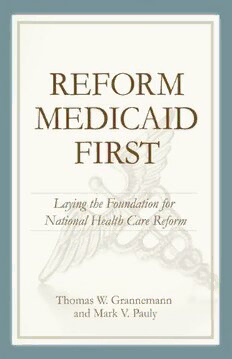
Reform Medicaid First: Laying the Foundation for National Health Care Reform PDF
68 Pages·2009·2.535 MB·English
Most books are stored in the elastic cloud where traffic is expensive. For this reason, we have a limit on daily download.
Preview Reform Medicaid First: Laying the Foundation for National Health Care Reform
Description:
As Congress contemplates major revisions to America's health care system, two leading health economists warn that significant differences among state Medicaid programs will hinder national health care reform. Thomas W. Grannemann and Mark V. Pauly argue that Medicaid will need to be reformed as an early step in any serious health care reform effort. While states such as Mississippi and Nevada spend as little as $5,000 per poor person annually, New York and Alaska annually spend more than $15,000 per Medicaid patient. Large differences remain even after correcting for cost-of-living and medical-price differences. This imbalance among states creates an uneven and unstable foundation for any national program to address the needs of uninsured Americans. The authors offer principles for reform designed to encourage equity, efficiency, and accountability in all publicly funded health care programs. They suggest changes in provider payment methods and federal/state financing designed to promote interstate equity, equality of payment across settings, claims-based accountability, provider network control, and value-based cost containment. Such reform will require upfront changes in Medicaid to improve access to high-value health care for low-income persons (particularly those in low-Medicaid-benefit states) and to help slow the rate of growth in medical costs. These changes will level the playing field for state programs and provide a crucial foundation for further national reform.
See more
The list of books you might like
Most books are stored in the elastic cloud where traffic is expensive. For this reason, we have a limit on daily download.
